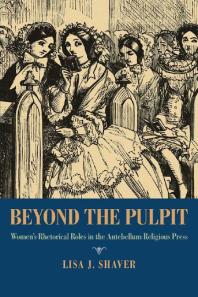(Ebook) Beyond the Pulpit : Women's Rhetorical Roles in the Antebellum Religious Press by Lisa J. Shaver ISBN 9780822977421, 0822977427
In the formative years of the Methodist Church in the United States, women played significant roles as proselytizers, organizers, lay ministers, and majority members. Although women's participation helped the church to become the nation's largest denomination by the mid-nineteenth century, their official roles diminished during that time. In Beyond the Pulpit, Lisa Shaver examines Methodist periodicals as a rhetorical space to which women turned to find, and make, self-meaning. In 1818, Methodist Magazine first published "memoirs" that eulogized women as powerful witnesses for their faith on their deathbeds. As Shaver observes, it was only in death that a woman could achieve the status of minister. Another Methodist publication, the Christian Advocate, was America's largest circulated weekly by the mid-1830s. It featured the "Ladies' Department," a column that reinforced the canon of women as dutiful wives, mothers, and household managers. Here, the church also affirmed women in the important rhetorical and evangelical role of domestic preacher. Outside the "Ladies Department," women increasingly appeared in "little narratives" in which they were portrayed as models of piety and charity, benefactors, organizers, Sunday school administrators and teachers, missionaries, and ministers' assistants. These texts cast women into nondomestic roles that were institutionally sanctioned and widely disseminated. By 1841, the Ladies' Repository and Gatherings of the West was engaging women in discussions of religion, politics, education, science, and a variety of intellectual debates. As Shaver posits, by providing a forum for women writers and readers, the church gave them an official rhetorical space and the license to define their own roles and spheres of influence. As such, the periodicals of the Methodist church became an important public venue in which women's voices were heard and their identities explored.
*Free conversion of into popular formats such as PDF, DOCX, DOC, AZW, EPUB, and MOBI after payment.


